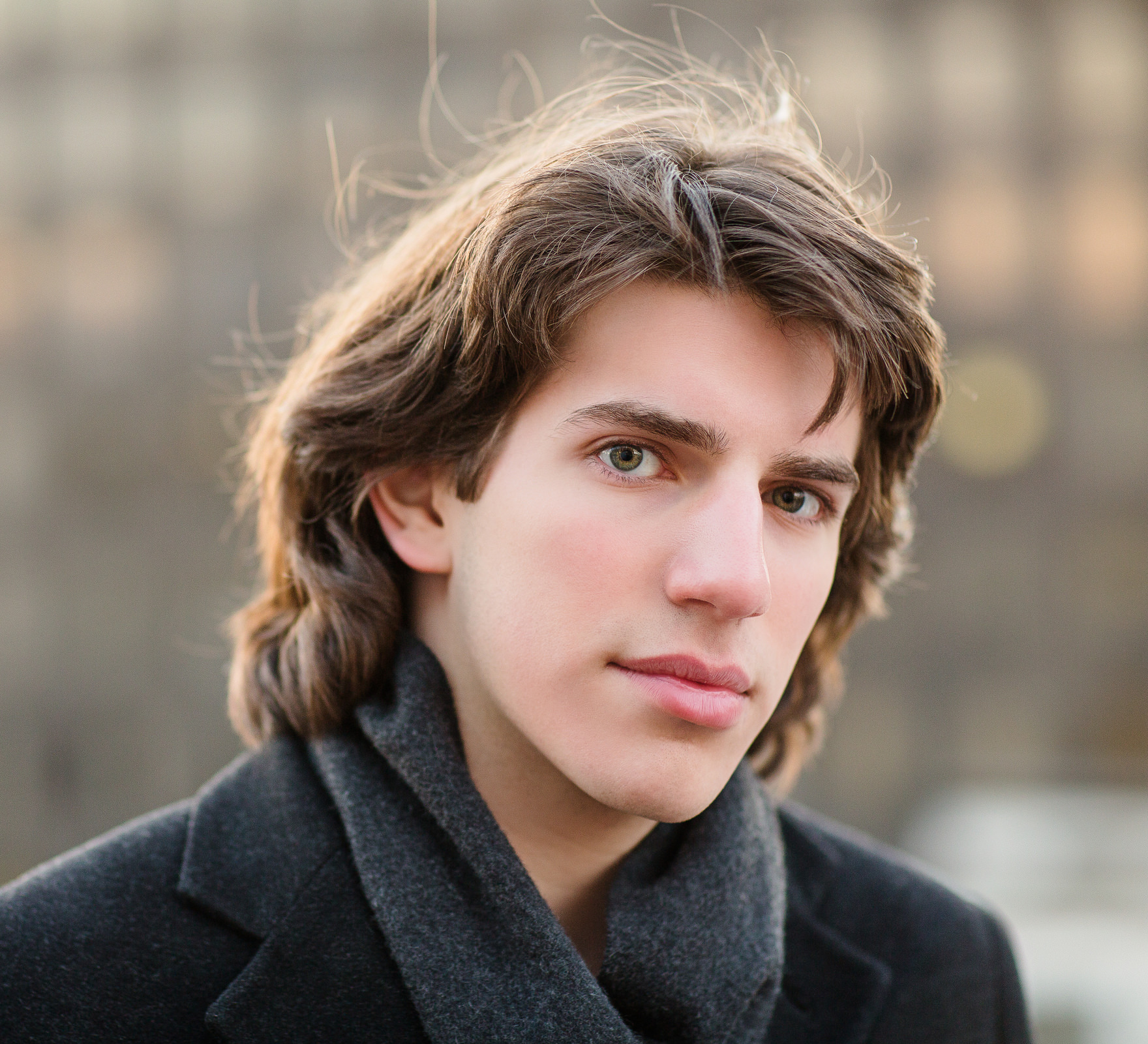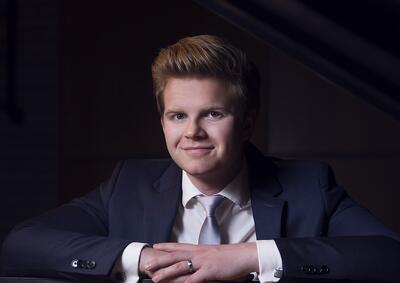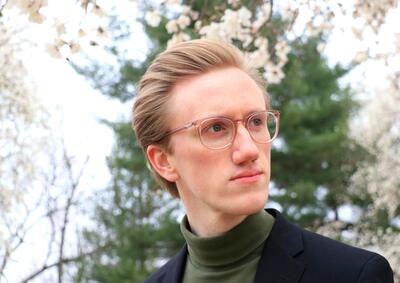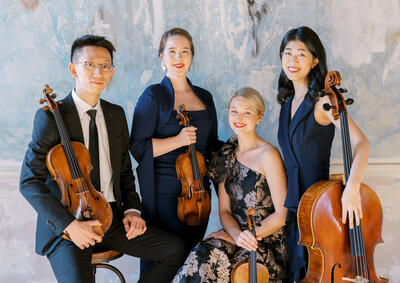Pianist Llewellyn Sanchez-Werner '20AD to perform Mozart concerto with Yale Philharmonia
On Friday, Feb. 22, artist-diploma candidate Llewellyn Sanchez-Werner will perform Mozart's Piano Concerto No. 20 with Principal Conductor Peter Oundjian and the Yale Philharmonia. We spoke with Sanchez-Werner about the concerto, studying with Boris Berman (the Sylvia and Leonard Marx Professor in the Practice of Piano), performing with an orchestra of his peers, and more.
Q: How did you settle on Mozart’s Piano Concerto No. 20 for this performance, and why?
A: Even among Mozart’s many magnificent piano concerti, this one stands out. One of only two in a minor key, K. 466 is in D minor, the same key as Mozart’s Requiem, Bach’s The Art of Fugue, Beethoven’s Ninth Symphony, Brahms’ First Piano Concerto. When one hears that D-minor tonality, it’s natural to think of tremendous gravity of spirit. The piece has a second movement titled “Romanze,” a rare marking for Mozart, and the way the third movement ends, a surprise turn to D major that leads to a conclusion of unbridled joy, is nothing short of miraculous.
Q: Mozart wasn’t too much older than you are now when he composed and premiered this piece. Does that offer you any kind of perspective or insight into the music?
A: While the movie Amadeus is a little over the top, it is absolutely right in one way: We know that Mozart was as dynamic, free, and uninhibited a character as any. His music is synonymous with larger-than-life drama, mercurial wit, boundless love, tragedy, and youthful idealism, and it is a fallacy of epic proportions that his music is merely “pretty” or “beautiful,” as it is so often labelled, with understandable reverence. His music speaks to someone my age as it would to someone of any age. It is relatable to all.
Q: This concerto was composed and received its premiere 234 years ago. Today, there are umpteen recordings of the piece. Why is important for people to hear it performed live and what would you want the audience to know before hearing you play it?
A: I am deeply excited to have written my own cadenzas for this concerto, my first time doing so. A compelling reason to hear this performance live is that you will hear something new! Mozart often didn’t have time (or need) to write down his cadenzas, frequently improvising them in performance, and this D minor is indeed one of those concerti without a cadenza in his hand. This leaves a grand opening for pianists to choose what cadenzas they will play—the most common choice is to play Beethoven’s, but occasionally you will hear those of Brahms, Clara Schumann, or Hummel. But improvising or writing your own cadenza is such a daunting, wondrous, and personal statement, and as Robert Levin would argue, the most true to capturing the Mozartian spirit.
Q: Tell us about working with Prof. Boris Berman on the concerto and in general. How has he informed your approach to music-making?
A: Studying with Boris Berman has been a revelation. His enlivening musical concepts, and his thorough and enriching method of instilling them, has already had an indelible impact on my artistry. He wants pianists to be as informed about all walks of life as we are capable on the keyboard. I have memories of his whisking me away to the clavichord in his studio when I played him Bach, of his showing me videos of Spanish dancing and telling me saucy tales of young romance when I played him Debussy, of his discussing orchestration to emulate brass and wind instruments when playing Stravinsky. Since he has himself performed this concerto, we have shared great joy working on it together.
Q: What are your thoughts about performing alongside your peers (members of the Yale Philharmonia)?
A: This is something I am truly looking forward to. I’ve only been at Yale for a few months, but my wonderful colleagues have already made it feel like a second home. I’m also presently performing piano-trio repertoire with the concertmaster (Kate Arndt '19MM), so playing with her for this concerto will be fun. Another Yale “peer” in the audience will be my mom—she lived in Trumbull College as part of the Class of ’77, one of the first, pioneering classes in which Yale accepted women. She has always enjoyed watching me perform, but I have a feeling she’ll enjoy this concert in particular.
Q: Beyond learning and practicing the notes, what goes into your preparation when studying a new score? (Is this concerto new to you?)
A: While I have performed several other Mozart concerti before, this is my first time with the D minor. Regarding my process of learning new concerti, I have made the switch to doing all of my practicing with the full score from the get-go (rather than only consulting it while practicing from a two-piano reduction, as I did when I was younger). This allows me to internalize the orchestration much earlier and better emulate the articulations and tone colors of other instruments.
Q: What, in your opinion, is the role of the artist in society?
A: Art is a cooperative affair, and musicians can and have contributed to a bold history of social engagement. I take pride in attempting to carry on such traditions of using music as a means of breaking down cultural and political barriers. As an example, in a cross-cultural exchange for peace on U.N. World Day for Cultural Diversity, I played with the fearless Iraqi National Symphony in Baghdad. Raising funds for the Children’s Cancer Hospital, we performed music by American, Iraqi, and European composers for an international audience of diplomats, Iraqis of all ages, and U.S. soldiers. My hope is that the simple, yet meaningful process of our warmhearted collaboration and musical communication (since music is our common language) deepened the bond between two cultures. I have done similar work in Rwanda, France, Canada, and the United States and seek to do much more.
Q: What have you been reading lately?
A: After re-reading Team of Rivals: The Political Genius of Abraham Lincoln, written by the ever-illuminating Doris Kearns Goodwin, I have recently turned to her autobiographical memoir, Wait Till Next Year, which tells the story of her upbringing through the lens of her family’s devotion to the Brooklyn Dodgers. This is why I was delighted to find out after a recital I gave last week in Chicago, that the subsequent event in that arts series would be a talk by her. I wish I could’ve stayed and met her! Books by great historians are a fascination of mine.
Llewellyn Sanchez-Werner will join Principal Conductor Peter Oundjian and the Yale Philharmonia on Friday, Feb. 22, for a performance of Mozart's Piano Concerto No. 20 in D minor, K. 466, on a program that also includes Kodály's Dances of Galánta and Dvořák's Symphony No. 6 in D major, Op. 60.






